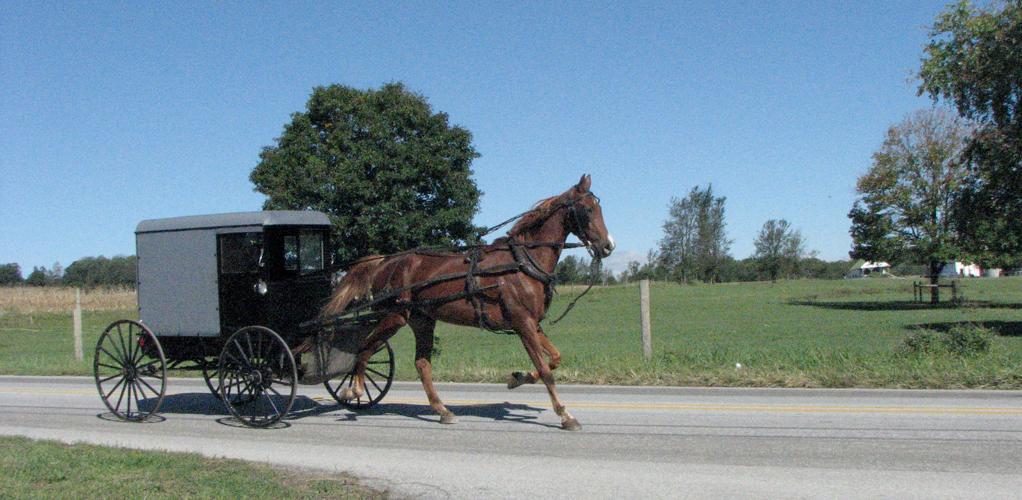Pennsylvania does not require the Amish to purchase or display a license plate on their buggies, and it would take an act of the state Legislature to change the rules.
But that law could soon change.
That’s the short answer to a question posed by a reader as part of LancasterOnline's reader-powered journalism project, We The People.
The question was submitted by reader Linda Galligan, who asked, “Why are license plates not required on horse and buggies and other farm equipment that use the public roads? It would be revenue for PA.”
Click here to find out how you can submit a question for We The People.
Alexis Campbell, community relations coordinator for the state Department of Transportation, said the Pennsylvania Vehicle Code exempts “any vehicle moved solely by animal or human power” from registering and displaying a license plate.
Harrisburg would have to draft a new law to change the requirements, Campbell said — and she is “unaware of any pending legislation that would make this change.”
She said she can’t speculate how much revenue could be generated if licensing were required, since PennDOT doesn’t keep track of the number of buggies on the road.
In fact, no state agency in Pennsylvania seems to compile those numbers.
New law proposed
According to the state House of Representatives website, the law could change soon.
House Bill 1670, introduced this year by state Rep. Michael K. Hanna, a Democrat representing Centre and Clinton counties, would require any horse-drawn vehicle that travels public roadways in Pennsylvania to display a plate.
The annual cost to register a horse-drawn vehicle would be $36, the draft bill states.
All funds collected through licensing of buggies, according to the bill, would be earmarked for “the purpose of road improvements, repairs or replacements due to damage on the roadways from the wear and tear from the steel wheels used on horse-drawn buggies.”
Anyone who violates the licensing requirement would face fines of up to $200.
The bill was referred to the House Transportation Committee on July 21.
Samantha Lockhart, a research analyst in Hanna’s Harrisburg office, said the issue is important to Hanna’s constituents “as they believe the steel wheels on the buggies are destroying the roads, so in order to help pay for repairs, we are introducing this language that will provide for such revenue.”
She said she does not know if the bill will be brought up for a vote.
State Rep. Mindy Fee, a Lancaster County Republican who serves on the Transportation Committee, could not immediately be reached for comment on the bill.
It works in Indiana
Indiana is the only state that requires license plates on Amish buggies, according to AmishAmerica.com.
Sarah Bonick, communications director for the Indiana Bureau of Motor Vehicles, said it’s not a state law, however.
Requirements for registration and plating, she said, are “controlled by individual counties in Indiana.”
The bureau does not keep a record of which counties require tags, Bonick added.
Farm vehicles aren’t exempt
As for the second part of Galligan’s question, Campbell pointed to a page on PennDOT’s website detailing the rules for titling and registering motorized farm vehicles and the exemptions that are available for them.
“There are regulations that specify that these vehicles may only be driven on the roadway between sunrise and sunset and, depending on the size of the vehicle, only within certain distances,” Campbell explained.
Depending on the type and use of the vehicle, the equipment may require general vehicle registration or special farm vehicle registration.
In either case, a plate is required.







 TOM KNAPP | Staff Writer
TOM KNAPP | Staff Writer
![Are bicycle riders required to obey traffic laws? [We the People report]](https://bloximages.newyork1.vip.townnews.com/lancasteronline.com/content/tncms/assets/v3/editorial/6/94/694aba00-97c0-11e7-a597-1f802f392f33/59b7e49765cfb.image.jpg?resize=150%2C100)
 CHAD UMBLE | Staff Writer
CHAD UMBLE | Staff Writer![Why has a head stared from an attic window in Peach Bottom for more than 100 years? [We the People report]](https://bloximages.newyork1.vip.townnews.com/lancasteronline.com/content/tncms/assets/v3/editorial/2/3f/23f44d44-ea4b-11e7-9a18-c793ee43cfac/5a426088acb19.image.jpg?crop=1416%2C1160%2C6%2C14&resize=150%2C123&order=crop%2Cresize)


